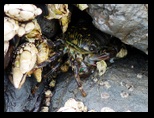
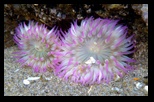
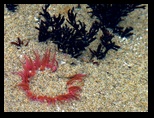

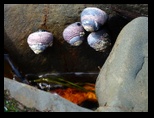
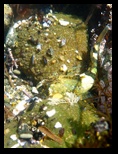
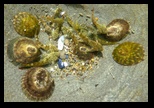
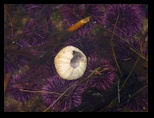
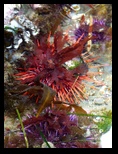
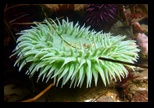
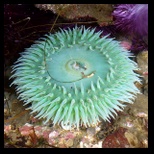
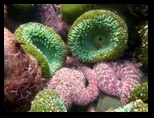
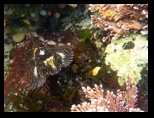

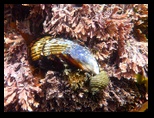
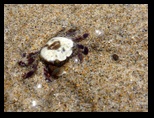
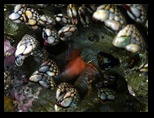
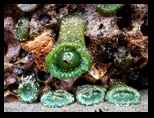
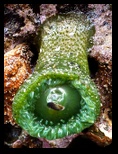
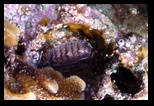
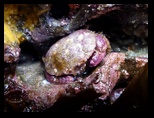
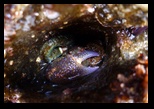
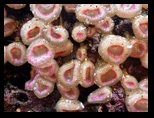
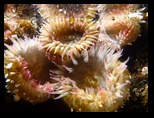
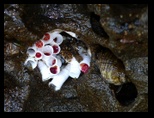
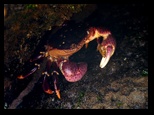
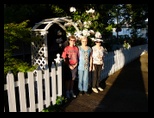


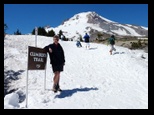

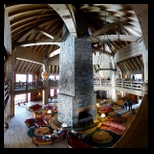
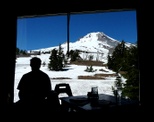
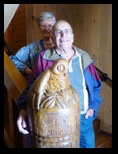
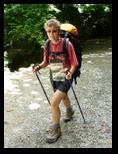
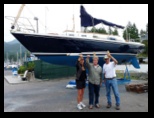
Click on a photo to enlarge it.
The Oregon coast welcomed us with lots of rain this time. We had been here two years ago for more than a month during which we explored literally every mile of this fantastic coast line. Unfortunately we didn't have that much time this year so we concentrated on our favourite spots, mainly to see the spectacular tidal pools again. The timing was perfect. We had a full moon and that means super low tides and lots of time to explore the tidal pools.
At Seal Rock near Newport we discovered a lot less of the colourful star fish compared to two years ago. There was lots of seaweed covering the rocks and we wondered if the radiation from Fukushima was at fault here. It was extremely slippery and we had to be careful not to fall on our precious behinds. Kirsten took a few nice shots of the sea anemones with our underwater camera. We didn't have that two years ago and it was worth having it now.
Girls from the Oregon Marine Science Center told us about Boiler Bay, apparently a good spot to see the 19-arms sunflower star fish. Boiler Bay is just north of Depot Bay and Helen decided to skip this exploration. The path down to the tidal pools was very steep and slippery and Helen didn't want to twist her ankles. She needs to stay healthy for her Camino hike. So Kirsten went on her own. No sunflower star fish but lots of purple and red sea urchins.
We got another tip from a woman for Road's End State Park just north of Lincoln City. A great spot to see the tidal pools and lots of small sea caves.
We continued to Cape Kiwanda. The tidal pools there are always worth a visit! It was the 1st of June and all State Park camp grounds were free for the night. We were in luck and got the last full-hookup spot at Cape Lookout. Helen used the afternoon to go on a 4 hour steep hike while Kirsten used the power in Winnie to work on her photos.
Phyllis and Russ gave us a home in Portland for the next week. We hadn't been there for a full 5 minutes and Russ carted us off to the next restaurant for fresh strawberry shortcake with lots of cream and ice cream. Oh, well ... life was hard again!
Phyllis and us took turns in cooking dinner every night. Fabulous food and great company. We spent two nights watching the fantastic photos from their India trip they took last winter. Great colours and impressions of a totally different world. We took one look at each other and said in unison: Let's go to India next winter!
We had actually planned to ship Winnie down to South America by December, but that has to wait for another year. Yes, we know, we are planning to go down to South America for years and postponing this trip seems to be a tradition by now. South America, don't worry ... we are coming ... one day!
We had really fast WiFi in Winnie and Kirsten used it to find information about India, Nepal, Tibet, Eastern China and Myanmar. We are thinking about a trip from November to next June so there should be plenty of time to explore the whole region. While Kirsten was on the computer Helen packed her backpack for trial and it turned out to be way too small for her long hiking trip.
Russ and Phyllis took us around Portland. Rose Garden, Willamette Falls, Old Portland and on Sunday we took a ride out to Mount Hood to see the famous Timberline Lodge. Russ used to work here as a bell boy in 1954. He earned 31 US cents an hour but the tips were great and he met a lot of famous people. The girls at the reception fell instantly in love with Russ and gave us a special tour to see a standard room and the Roosevelt Suite. Russ wanted to know what had changed in 60 years. The rooms were pretty much the same - quiet rustic - but the prices had sky-rocketed since then. A standard room is 240US$ a night, the Roosevelt Suite 350US$.
Here is an excerpt from Wikipedia about the Timberline Lodge:
Timberline Lodge is a mountain lodge on the south side of Mount Hood in Oregon, about 60 miles (97 km) east of Portland.
Built in the late 1930s, this National Historic Landmark sits at an elevation of 5,960 feet (1,817 m), within the Mount Hood National Forest and is accessible through the Mount Hood Scenic Byway. It is a popular tourist attraction, drawing more than a million visitors annually. The lodge was constructed between 1936 and 1938 as a Works Progress Administration (WPA) project during the Great Depression. Workers used large timbers and local stone, and placed intricately carved decorative elements throughout the building.
President Franklin D. Roosevelt dedicated the Lodge on September 28, 1937. In his remarks, he commented on the reasons for the project:
"This Timberline Lodge marks a venture that was made possible by W.P.A., emergency relief work, in order that we may test the workability of recreational facilities installed by the Government itself and operated under its complete control.
Here, to Mount Hood, will come thousands and thousands of visitors in the coming years. Looking east toward eastern Oregon with its great livestock raising areas, these visitors are going to visualize the relationship between the cattle ranches and the summer ranges in the forests. Looking westward and northward toward Portland and the Columbia River, with their great lumber and other wood using industries, they will understand the part which National Forest timber will play in the support of this important element of northwestern prosperity.
Those who will follow us to Timberline Lodge on their holidays and vacations will represent the enjoyment of new opportunities for play in every season of the year. I mention specially every season of the year because we, as a nation, I think, are coming to realize that the summer is not the only time for play. I look forward to the day when many, many people from this region of the Nation are going to come here for skiing and tobogganing and various other forms of winter sports."
The dedication ceremony was five months before completion of the lodge interior February 1938, when it opened to the public. It took extra expense and effort to make the lodge appear presentable for the dedication.
We left Portland and headed straight to Canada. At a Walmart we bought two new backpacks and Helen favoured the larger one for her hike through France and Spain. We had no problems to cross the border and stayed the next 10 days in North Vancouver with Brian and Lily.
North Vancouver is hilly and we just had to walk off Brian's property to get to a wonderful hiking path in the woods. We used it everyday for a trainings session, Helen in full gear with her heavy backpack. She had plenty of time to get used to the weight and to adjust the backpack and her stuff inside accordingly.
Brian, he turned 80 this January, took a job painting a sailing boat down at the marina. He was assisted by Janet, his former business partner. Brian fell of the scaffolding and got a really bad bruise on the inside of his upper leg. He could hardly walk and had to use crutches to get around. Janet was hardly better off. She has a bad back and is waiting for years to get an operation done. Every evening both came home totally stiff and exhausted. Unfortunately we couldn't help them with the painting. It takes years to get the right technique worked out. At least we managed to help them taking down the scaffolding at the end. The boat looked great though!
Janet organised ramps to put Winnie up so we could check out the leak in our radiator. It's fairly small and we probably will need a new radiator one day. Not worth buying now though because we will not move Winnie much in the next 12 months, so we just added some Irontight to the radiator and that seemed to have stopped the leak for now.
Helen could hardly wait to get on her plane to Geneva. On our last night we watched the movie "The Way" with Martin Sheen. It's made out of a few true stories from the Camino de Santiago. Martin Sheen plays a father who's son dies on the first day of walking the Camino. Dad flies to Saint Jean Pied de Port to cremate his son and spontaneously straps on his son's backpack to walk the Camino for him. Along the way he meets other people, who end up to become really good friends. He also disperses the ash of his son along the way.
Needless to say that Kirsten cried through most of the film. Under tears she told Helen while the critics were running: You better make it! I'm not going to hike 1200 miles!
On Monday, the 24th of June, Kirsten took Helen down to the SeaBus. We said goodbye in the pouring rain - hopefully no bad omen for Helen's trip! Helen will be gone for 3,5 months, the longest time we ever have separated! But both of us will be very busy and the time until Helen's return to Vancouver will hopefully fly fast.
Kirsten continued to the Okanagan Valley and visited Klaus and Joyce for a couple of hours in Abbotsford along the way.
P.S. This report was written by Kirsten. Helen just didn't have enough time before she flew out to Geneva.